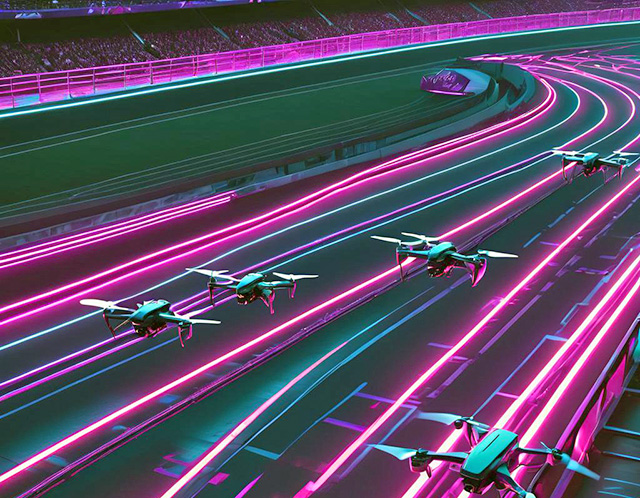The Olympic Games have traditionally been associated with elitism and the demonstration of the best of human talents. Looking back, technology has shaped changes in sports and fan interaction, and it is expected to continue as a strong factor in the future development of the Olympic movement.
 drone racing and esports may be part of the future of Olympics (AI Image)
drone racing and esports may be part of the future of Olympics (AI Image)The Evolution of Technology in the Olympics
As strange as it might sound, technology was already present in the Olympics even in the early days, though it is used in a completely different way today. It is often said that every new technology has one of three purposes in sports: to make things fairer, more interesting, or more accessible, and each new technological invention within the context of the games has been a step in this direction.
Early Innovations
Technology is therefore at a primitive stage in the early ages. The first revolution was in the measurement of the start and finish times in athletics, with the use of electronic timing at the 1912 Stockholm Olympics. This was a great plus because it now became possible to have accurate and reliable measurements of the athletes’ performances. Before this, the timing of races was by handheld stopwatches, which were clearly inclined to errors based on human estimation.
Television and Broadcasting
Television was also used for the first time though to a limited extent, at the Olympic Games of 1936 held in Berlin Germany. By 1960, improvements in satellite technology helped the Rome Olympics to be broadcast live. It brought the Olympics straight into millions of households and turned the Olympic Games into a truly global event.
Modern Technologies Transforming the Olympics
Over the years, technology has influenced the Olympics in various ways. Below are some of the most effective technologies that define the games in the current age.
Advanced Timing and Scoring Systems
Modern technical solutions for the calculation of time and scores have increased the accuracy in many sporting events. Judges can utilize technologies such as RFID fitting and photo-finish cameras to determine performances to the accuracy of microseconds. This precision is relevant to establish more equitable competition, and to document the incredible athlete performances accurately.
Wearable Technology
Wearable technology has been comprehensively adopted in many sporting disciplines and has become an indispensable element of the training process. Smart wearables like smartwatches and fitness tracking devices measure the updated physiological state of an athlete including heart rate, sleep, and more.
This information can in turn be used by coaches to plan specialized training for all athletes and come up with training plans during training sessions to ensure that an athlete will perform best on a particular day of competition.
Virtual reality (VR) and Augmented reality (AR)
VR and AR are two technologies revolutionizing the manner in which viewers engage with sports. With the help of VR, enthusiasts can attend events as if they were at the stadium. AR can offer viewers immediate textual and numerical data live on their screens during transmissions adding value to their experience.
Drones
Drones are now a must-have when shooting footage of events. The opportunity to obtain aerial shots when filming the games to allow viewers to see the events from different angles is useful; moreover, their practical potential in the organization of the transport of some goods may be used.
Artificial Intelligence
AI can be used in the Olympics in a number of ways. It can be applied to virtually anything, from studying the performance of an athlete to deciding an outcome. With the collaborative use of AI, coaches can develop training plans that are much more effective, based on the analysis of the strengths and the less effective aspects of the athlete’s movements. Moreover, ordinary analytics offers fans more profound insights into the games through artificial intelligence.
The Future Directions of Olympic Technology
It is evident that the integration and use of modern technology in the organization of the Olympics have a clear and progressive future in the years to come. There are many possible ways that we are likely to witness the use of technology at the Olympic Games in the future.
The Olympic Games have always been a showpiece of human performance and now technology allows it to take it to the next level. The Olympic future is bright and one can say unlimited. Technological change is bound to continue into the future, and the Olympics as the world's major sporting event will continue to be at the forefront of technological changes and innovation.
Related Pages
- Technology and The Olympic Games
- Science and the Olympics
- Emerging Trends in Sports Technology
- Technology in Sports


 Current Events
Current Events